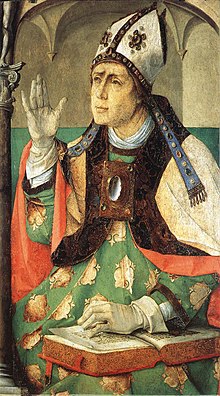Saint Augustine
| Augustine of Hippo | |
|---|---|
| Bishop of Hippo Regius | |

Painting by Justus van Gent, circa 1474
|
|
| Diocese | Hippo Regius |
| Appointed | 395 |
| Installed | 396 |
| Term ended | 430 |
| Orders | |
| Ordination | 391 |
| Consecration | 395 |
| Personal details | |
| Birth name | Aurelius Augustinus |
| Born |
13 November 354 Thagaste, Numidia (modern-day Souk Ahras, Algeria) |
| Died | 28 August 430 (aged 75) Hippo Regius, Numidia (within modern-day Annaba, Algeria) |
| Buried | San Pietro in Ciel d'Oro, Pavia, Italy |
| Denomination | Nicene Christianity |
| Sainthood | |
| Feast day | 28 August (Western) 15 June (Eastern) 4 November (Assyrian) |
| Venerated in | All Christian denominations which venerate saints |
| Title as Saint | Bishop, philosopher, theologian, Doctor of the Church (Doctor of Grace), and Church Father |
| Canonized | Pre-Congregation |
| Attributes | Child; dove; pen; shell, pierced heart, holding book with a small church, bishop's staff, miter |
| Patronage |
Brewers; printers; theologians; Bridgeport, Connecticut; Cagayan de Oro, Philippines; San Agustin, Isabela |
| Shrines | San Pietro in Ciel d'Oro, Pavia, Italy |
| Augustine of Hippo | |
|---|---|
| Notable work | |
| Era | Ancient philosophy |
| Region | Western Philosophy |
| School | Christian philosophy |
|
Main interests
|
Theology |
|
Notable ideas
|
Predestination, just war theory |
|
Influences
|
|
|
Influenced
|
|
Augustine of Hippo (/ɔːˈɡʌstᵻn/; 13 November 354 – 28 August 430) was an early Christian theologian and philosopher whose writings influenced the development of Western Christianity and Western philosophy. He was the bishop of Hippo Regius (within modern-day Annaba, Algeria), located in Numidia (Roman province of Africa). Augustine is viewed as one of the most important Church Fathers in Western Christianity for his writings in the Patristic Era. Among his most important works are The City of God and Confessions.
According to his contemporary, Jerome, Augustine "established anew the ancient Faith." In his early years, he was heavily influenced by Manichaeism and afterward by the neo-Platonism of Plotinus. After his baptism and conversion to Christianity in 386, Augustine developed his own approach to philosophy and theology, accommodating a variety of methods and perspectives. Believing that the grace of Christ was indispensable to human freedom, he helped formulate the doctrine of original sin and made seminal contributions to the development of just war theory. When the Western Roman Empire began to disintegrate, Augustine developed the concept of the Church as a spiritual City of God, distinct from the material Earthly City. His thoughts profoundly influenced the medieval worldview. The segment of the Church that adhered to the concept of the Trinity as defined by the Council of Nicaea and the Council of Constantinople closely identified with Augustine's On the Trinity.
...
Wikipedia
